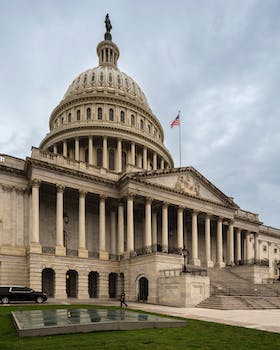

-
Table of Contents
"The Power to Uphold Equality: Congress' Authority in Enforcing the Reconstruction Amendments"
Introduction
The Reconstruction Amendments, consisting of the 13th, 14th, and 15th Amendments to the United States Constitution, were enacted during the Reconstruction Era following the American Civil War. These amendments aimed to address the issues of slavery, citizenship, equal protection, and voting rights for African Americans. The authority of Congress in enforcing the Reconstruction Amendments is a crucial aspect of ensuring their effectiveness and upholding the principles of equality and civil rights in the United States.
The Role of Congress in Enforcing the Reconstruction Amendments
The Reconstruction Amendments, consisting of the 13th, 14th, and 15th Amendments to the United States Constitution, were enacted in the aftermath of the Civil War to address the issues of slavery, citizenship, and voting rights. These amendments were intended to ensure the equal protection of the law and the rights of all citizens, regardless of race or color. While the amendments themselves provided a framework for equality, it was up to Congress to enforce and protect these rights.
Congress played a crucial role in enforcing the Reconstruction Amendments through legislation and oversight. The 13th Amendment, ratified in 1865, abolished slavery and involuntary servitude, except as punishment for a crime. To enforce this amendment, Congress passed the Civil Rights Act of 1866, which granted citizenship and equal rights to all persons born in the United States, regardless of race or color. This act also authorized federal courts to hear cases involving violations of civil rights, providing a means for individuals to seek redress for their grievances.
The 14th Amendment, ratified in 1868, further expanded the rights of citizens and provided equal protection under the law. It granted citizenship to all persons born or naturalized in the United States and prohibited states from denying any person the equal protection of the laws. To enforce this amendment, Congress passed the Civil Rights Act of 1871, also known as the Ku Klux Klan Act. This act aimed to combat the violence and intimidation tactics used by white supremacist groups to suppress the rights of African Americans. It authorized the president to use federal troops to protect citizens and allowed individuals to sue in federal court for violations of their civil rights.
In addition to legislation, Congress exercised its oversight powers to ensure the enforcement of the Reconstruction Amendments. The House of Representatives and the Senate held hearings and investigations to uncover violations of civil rights and to hold individuals accountable. For example, the Joint Committee on Reconstruction, established in 1867, conducted extensive investigations into the activities of the Ku Klux Klan and other white supremacist organizations. These investigations led to the arrest and prosecution of numerous individuals involved in acts of violence and intimidation.
Furthermore, Congress used its power of the purse to enforce the Reconstruction Amendments. It allocated funds for the enforcement of civil rights laws and for the protection of citizens. For instance, Congress provided funding for the Freedmen's Bureau, an agency established to assist newly freed slaves in their transition to freedom. The bureau provided education, healthcare, and employment assistance to African Americans, helping them exercise their newly acquired rights.
Despite Congress's efforts, the enforcement of the Reconstruction Amendments faced significant challenges. The Supreme Court, through its interpretation of the amendments, limited the scope of congressional authority. In the Slaughter-House Cases of 1873, the Court narrowly interpreted the privileges and immunities clause of the 14th Amendment, effectively limiting its protection to only a few fundamental rights. This decision weakened Congress's ability to enforce the equal protection of the law.
In conclusion, Congress played a vital role in enforcing the Reconstruction Amendments through legislation, oversight, and the allocation of funds. It passed laws to protect the rights of citizens and authorized federal courts to hear cases involving violations of civil rights. Congress also used its oversight powers to investigate and hold individuals accountable for their actions. However, the Supreme Court's interpretation of the amendments posed challenges to the enforcement efforts. Despite these challenges, Congress's authority in enforcing the Reconstruction Amendments remains a significant aspect of American history and the ongoing struggle for equality.
Congressional Powers and the Reconstruction Amendments

The Reconstruction Amendments, consisting of the Thirteenth, Fourteenth, and Fifteenth Amendments to the United States Constitution, were enacted in the aftermath of the Civil War to address the issues of slavery, citizenship, and voting rights. These amendments granted Congress the authority to enforce their provisions through appropriate legislation. This article will explore the authority of Congress in enforcing the Reconstruction Amendments and the significance of this power.
The Thirteenth Amendment, ratified in 1865, abolished slavery and involuntary servitude, except as punishment for a crime. To ensure its enforcement, Congress was given the power to pass laws that would eradicate the vestiges of slavery and protect the newly freed slaves from discrimination. This authority allowed Congress to enact legislation such as the Civil Rights Act of 1866 and the Civil Rights Act of 1875, which aimed to secure equal rights for all citizens, regardless of race or color.
The Fourteenth Amendment, ratified in 1868, granted citizenship to all persons born or naturalized in the United States and prohibited states from denying any person equal protection of the laws. Congress was empowered to enforce this amendment through appropriate legislation. In exercising this authority, Congress passed the Civil Rights Act of 1871, also known as the Ku Klux Klan Act, which aimed to combat the violence and intimidation perpetrated by the Ku Klux Klan against African Americans and their supporters.
The Fifteenth Amendment, ratified in 1870, prohibited the denial of the right to vote based on race, color, or previous condition of servitude. Congress was given the power to enforce this amendment through appropriate legislation. In response, Congress passed the Enforcement Acts of 1870 and 1871, which aimed to protect the voting rights of African Americans by combating voter intimidation and fraud.
The authority of Congress in enforcing the Reconstruction Amendments was significant in several ways. Firstly, it allowed Congress to address the systemic discrimination and oppression faced by African Americans in the post-Civil War era. By passing legislation to enforce the amendments, Congress sought to ensure that the promises of freedom, equality, and citizenship were not mere words on paper, but tangible rights that could be enjoyed by all.
Secondly, the authority of Congress in enforcing the Reconstruction Amendments helped to establish the federal government as a protector of civil rights. Prior to the Civil War, the federal government had been relatively limited in its ability to intervene in matters of individual rights and state laws. However, the Reconstruction Amendments and the authority granted to Congress expanded the role of the federal government in safeguarding the rights of all citizens, particularly those who had been historically marginalized.
Lastly, the authority of Congress in enforcing the Reconstruction Amendments played a crucial role in shaping the legal landscape of the United States. The legislation passed by Congress to enforce the amendments laid the foundation for future civil rights laws and court decisions. The principles established during the Reconstruction era continue to influence the interpretation and application of civil rights laws today.
In conclusion, the authority of Congress in enforcing the Reconstruction Amendments was a pivotal development in American history. It allowed Congress to address the issues of slavery, citizenship, and voting rights, and ensured that the promises of the amendments were not empty words. This authority helped establish the federal government as a protector of civil rights and shaped the legal landscape of the United States. The significance of this power cannot be overstated, as it continues to impact the lives of individuals and the course of American democracy.
Challenges to Congressional Authority in Enforcing the Reconstruction Amendments
The Reconstruction Amendments, consisting of the 13th, 14th, and 15th Amendments to the United States Constitution, were enacted in the aftermath of the Civil War to secure the rights and freedoms of newly freed slaves. These amendments granted Congress the authority to enforce their provisions through appropriate legislation. However, challenges to congressional authority in enforcing the Reconstruction Amendments have emerged over the years, raising important questions about the scope and limits of Congress's power.
One of the primary challenges to congressional authority in enforcing the Reconstruction Amendments is the tension between federal and state power. The amendments were intended to empower Congress to protect the rights of all citizens, particularly those who had been oppressed and marginalized. However, some argue that this authority encroaches upon the traditional powers of the states, infringing upon their sovereignty. This tension has led to legal battles and debates over the proper balance between federal and state authority.
Another challenge to congressional authority in enforcing the Reconstruction Amendments is the interpretation of the amendments themselves. The language of the amendments is broad and open to interpretation, leaving room for differing opinions on the extent of Congress's power. For example, the 14th Amendment, which guarantees equal protection under the law, has been the subject of numerous Supreme Court cases that have shaped the understanding of its scope. These interpretations have sometimes limited the authority of Congress in enforcing the amendments, as the Court has sought to strike a balance between protecting individual rights and preserving the autonomy of the states.
Additionally, challenges to congressional authority in enforcing the Reconstruction Amendments have arisen from political opposition. Throughout history, there have been individuals and groups who have resisted efforts to enforce the amendments, often due to their own vested interests or ideological beliefs. This opposition has manifested in various forms, including legal challenges, lobbying efforts, and public campaigns. These challenges have tested the resolve of Congress and the strength of its authority, highlighting the ongoing struggle to ensure the full realization of the rights and freedoms guaranteed by the Reconstruction Amendments.
Despite these challenges, Congress has played a crucial role in enforcing the Reconstruction Amendments and protecting the rights of all citizens. Through legislation such as the Civil Rights Act of 1964 and the Voting Rights Act of 1965, Congress has taken significant steps to combat discrimination and ensure equal treatment under the law. These laws have been instrumental in dismantling segregation, expanding voting rights, and promoting equality in various spheres of society.
In conclusion, the authority of Congress in enforcing the Reconstruction Amendments has faced numerous challenges throughout history. These challenges have stemmed from tensions between federal and state power, differing interpretations of the amendments, and political opposition. However, Congress has persevered in its efforts to protect the rights and freedoms of all citizens, enacting legislation that has had a profound impact on American society. While the scope and limits of congressional authority in enforcing the Reconstruction Amendments continue to be debated, there is no doubt that Congress has played a vital role in shaping the course of civil rights in the United States.
Q&A
1. What is the authority of Congress in enforcing the Reconstruction Amendments?
Congress has the authority to pass legislation and take actions to enforce the provisions of the Reconstruction Amendments.
2. How does Congress enforce the Reconstruction Amendments?
Congress can pass laws, such as the Civil Rights Act of 1964 and the Voting Rights Act of 1965, to protect and enforce the rights guaranteed by the Reconstruction Amendments.
3. Can Congress enforce the Reconstruction Amendments through other means?
Yes, Congress can also use its oversight powers to investigate and address violations of the Reconstruction Amendments, as well as provide funding and support for programs aimed at promoting equality and protecting civil rights.
Conclusion
In conclusion, the authority of Congress in enforcing the Reconstruction Amendments is significant. Through legislation and oversight, Congress plays a crucial role in ensuring the protection of civil rights and equal treatment for all citizens. The Reconstruction Amendments, including the Thirteenth, Fourteenth, and Fifteenth Amendments, grant Congress the power to pass laws and take necessary actions to enforce these constitutional provisions. This authority allows Congress to address issues of racial discrimination, voting rights, and equal protection under the law. Overall, the authority of Congress in enforcing the Reconstruction Amendments is essential for upholding the principles of equality and justice in the United States.












